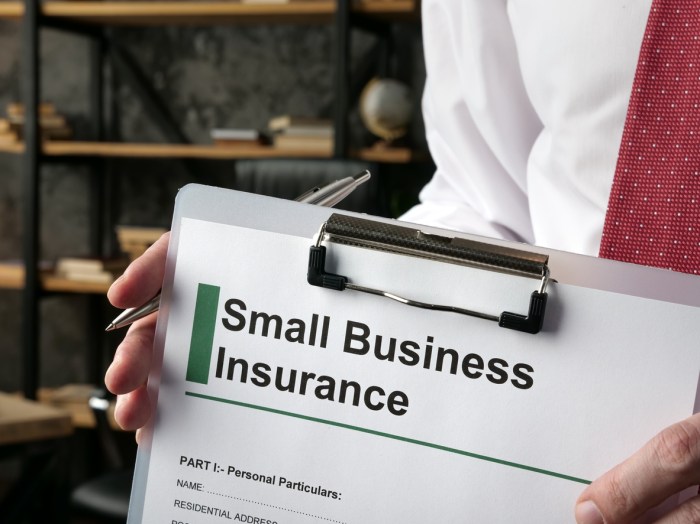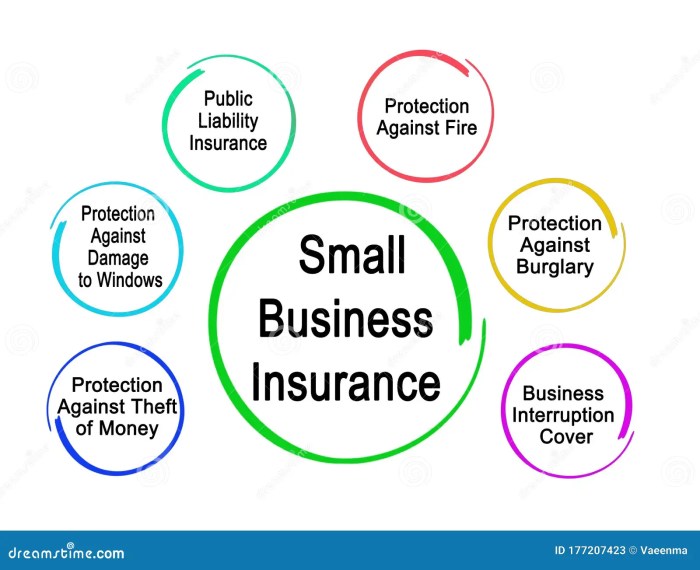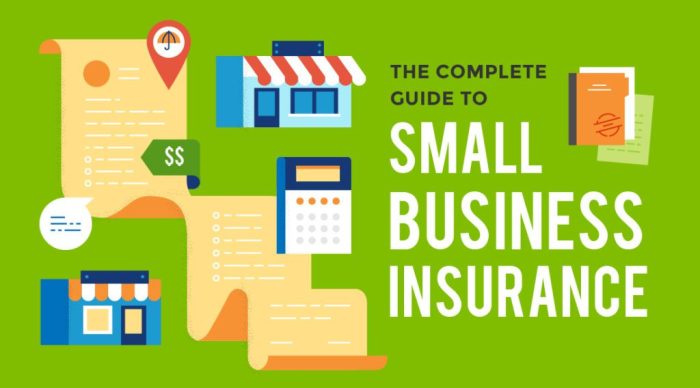Small Business Insurance Coverage Explained in Simple Terms: A Comprehensive Guide
Delving into Small Business Insurance Coverage Explained in Simple Terms, we embark on a journey to unravel the complexities of insurance for small businesses in a clear and straightforward manner. This guide aims to demystify the world of insurance, offering valuable insights and practical advice for business owners navigating this essential aspect of their operations.
Small Business Insurance Overview
Small business insurance is essential for protecting the assets and operations of small businesses. It provides financial coverage in case of unexpected events that could otherwise lead to significant losses.
Common Types of Insurance Coverage for Small Businesses
- General Liability Insurance: This type of insurance protects small businesses from third-party claims of bodily injury, property damage, and other liabilities.
- Property Insurance: Property insurance covers physical assets such as buildings, equipment, inventory, and furniture in case of damage or loss due to fire, theft, or other covered events.
- Professional Liability Insurance: Also known as errors and omissions insurance, this coverage protects small businesses from claims of negligence or inadequate work performance.
- Workers' Compensation Insurance: This insurance is mandatory in most states and provides coverage for medical expenses and lost wages for employees who are injured on the job.
Risks of Inadequate Insurance Coverage for Small Businesses
Without adequate insurance coverage, small businesses are vulnerable to financial risks that could potentially lead to bankruptcy or closure. For example, a lawsuit from a customer or employee could result in costly legal fees and settlements that could cripple a small business without liability insurance.
Similarly, property damage or loss without property insurance could mean the end of a small business's operations.
Types of Small Business Insurance
Insurance is crucial for small businesses to protect themselves from unexpected events that could result in financial losses. Here are some key types of insurance policies available for small businesses:
General Liability Insurance
General liability insurance provides coverage for legal costs and damages if your business is sued for bodily injury, property damage, or advertising injury. It is essential for small businesses as it protects against common risks that can arise during operations.
Property Insurance
Property insurance covers damage to your business property, such as buildings, equipment, inventory, and furniture, due to fire, theft, vandalism, or other covered perils. It is vital for small businesses to safeguard their assets and ensure continuity in case of property damage.
Workers' Compensation Insurance
Workers' compensation insurance is mandatory in most states and provides benefits to employees who are injured or become ill on the job. It helps cover medical expenses, lost wages, and rehabilitation costs, protecting both the employees and the business.
Professional Liability Insurance
Professional liability insurance, also known as errors and omissions insurance, covers legal costs and damages resulting from professional mistakes or negligence. It is crucial for service-based businesses, such as consultants, lawyers, and accountants, to protect against claims of malpractice.
Business Interruption Insurance
Business interruption insurance helps cover lost income and operating expenses if your business is unable to operate due to a covered event, such as a natural disaster. It is essential for small businesses to maintain financial stability during unexpected disruptions.
Commercial Auto Insurance
Commercial auto insurance provides coverage for vehicles used for business purposes, protecting against accidents, damage, and liability. It is necessary for businesses that rely on vehicles for operations, ensuring financial protection in case of accidents.Each type of insurance plays a crucial role in safeguarding small businesses from various risks and uncertainties, allowing them to focus on growth and success without worrying about potential losses.
Choosing the Right Coverage

When it comes to selecting insurance coverage for a small business, there are several crucial factors that business owners need to consider. Assessing the insurance needs of a small business is a vital step in ensuring adequate protection against potential risks.
Customizing insurance coverage based on the nature of the business is also essential to guarantee comprehensive coverage.
Assessing Insurance Needs
- Identify Potential Risks: Evaluate the specific risks that your business is exposed to, such as property damage, liability claims, or business interruption.
- Assess Legal Requirements: Understand the insurance requirements mandated by law for your type of business and location.
- Evaluate Business Assets: Determine the value of your business assets, including equipment, inventory, and intellectual property, to ensure they are adequately protected.
Customizing Coverage
- Consider Business Size: Tailor your insurance coverage to the size of your business, taking into account the number of employees, revenue, and industry.
- Review Policy Limits: Ensure that the coverage limits are sufficient to cover potential losses without leaving your business vulnerable.
- Specialized Coverage: Depending on the nature of your business, consider specialized insurance policies like cyber insurance, professional liability insurance, or commercial auto insurance.
Cost of Small Business Insurance

When it comes to small business insurance, the cost can vary depending on various factors. Understanding how insurance premiums are calculated and knowing how to manage insurance costs effectively is crucial for small business owners.
How Insurance Premiums are Calculated
Insurance premiums for small businesses are typically calculated based on several factors, including:
- The type of business and industry you are in
- The size of your business
- The location of your business
- The coverage limits and deductibles you choose
- Your claims history
Tips for Managing Insurance Costs
Here are some tips that small business owners can follow to manage insurance costs effectively:
- Shop around and compare quotes from different insurance providers
- Bundle your insurance policies to potentially get a discount
- Implement risk management strategies to reduce the likelihood of claims
- Consider higher deductibles to lower your premiums
- Review your coverage regularly to ensure you are not overpaying for unnecessary coverage
Potential Consequences of Underinsuring or Overinsuring
Underinsuring your small business can leave you vulnerable to financial loss in the event of a claim that exceeds your coverage limits. On the other hand, overinsuring can lead to paying higher premiums for coverage you may not need. It is essential to strike a balance and ensure you have the right amount of coverage to protect your business without overpaying.
Claims Process and Coverage Limits
When it comes to small business insurance, understanding the claims process and coverage limits is crucial for business owners to ensure they are adequately protected in case of unexpected events.
Filing an Insurance Claim
- Notify your insurance provider immediately after an incident that may lead to a claim.
- Complete the necessary claim forms and provide any requested documentation to support your claim.
- Cooperate with the insurance company's investigation and provide any additional information they may require.
- Once the claim is approved, the insurance company will provide the agreed-upon coverage amount to help you recover from the loss.
Coverage Limits and Implications
- Insurance policies have limits on the maximum amount they will pay out for a claim.
- Exceeding coverage limits can leave a business vulnerable to financial loss if the claim amount exceeds the policy limit.
- Business owners should carefully review and understand their coverage limits to ensure they have adequate protection.
Examples of Coverage Limits
- If a small retail store suffers a fire and the damage exceeds the property insurance limit, the owner may have to cover the remaining costs out of pocket.
- In a liability claim where a customer is injured on the premises, the general liability insurance may have a limit that, if exceeded, could lead to the business owner being responsible for additional costs.
Final Wrap-Up

In conclusion, Small Business Insurance Coverage Explained in Simple Terms equips small business owners with the knowledge and tools necessary to make informed decisions about their insurance needs. By understanding the importance of adequate coverage, choosing the right policies, and managing costs effectively, businesses can safeguard their operations and thrive in an ever-changing landscape.
User Queries
What are the consequences of underinsuring a small business?
Underinsuring a small business can leave it vulnerable to financial losses in the event of unforeseen circumstances, potentially leading to business closure.
How are insurance premiums calculated for small businesses?
Insurance premiums for small businesses are typically calculated based on factors such as the type of business, coverage limits, and past claims history.
Why is it important to customize insurance coverage for a small business?
Customizing insurance coverage ensures that a small business is adequately protected against specific risks unique to its operations, offering tailored solutions for comprehensive coverage.




